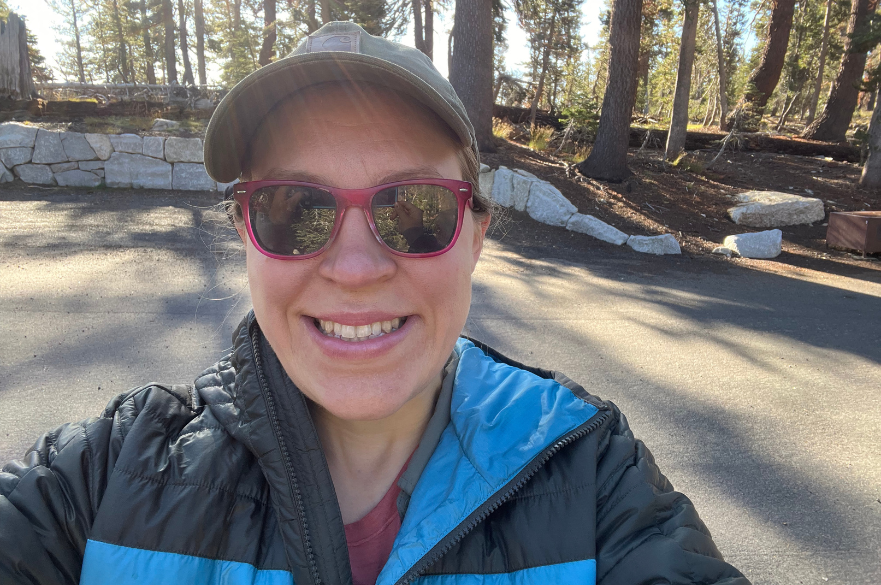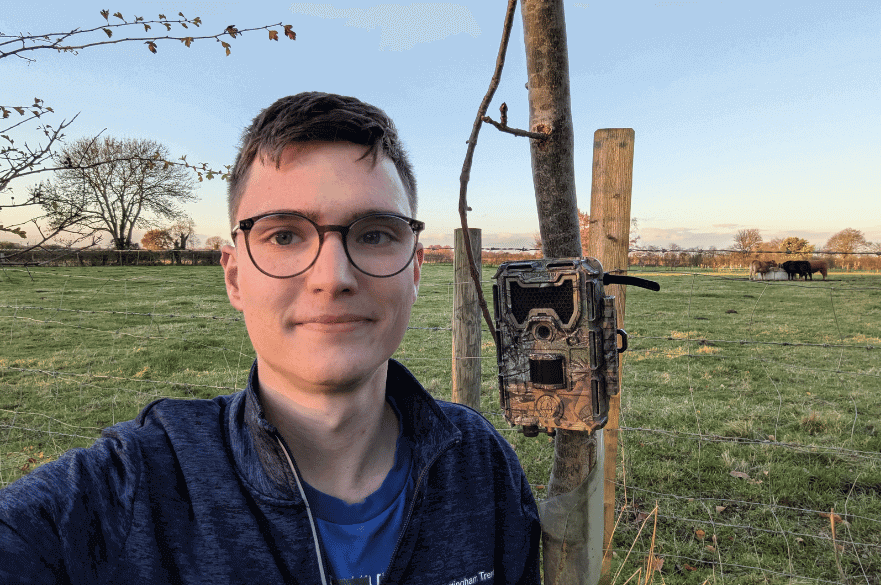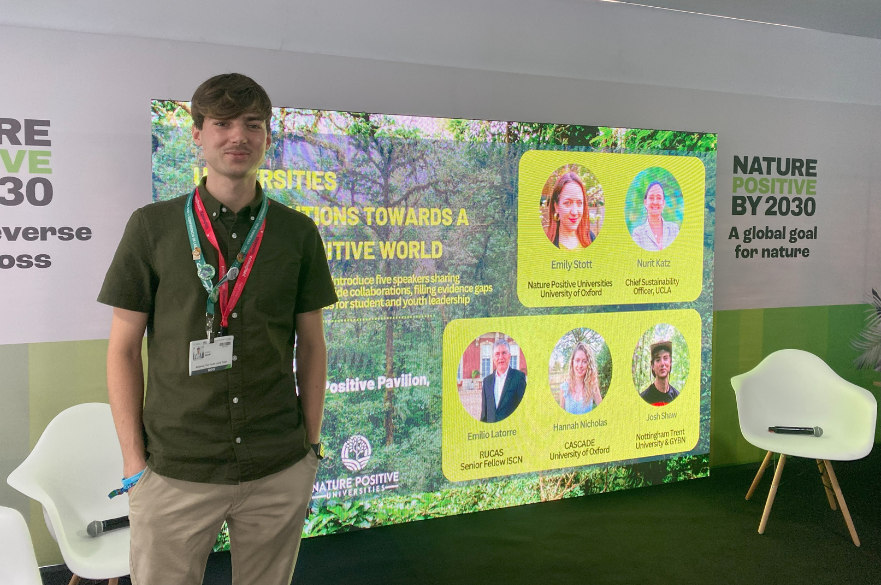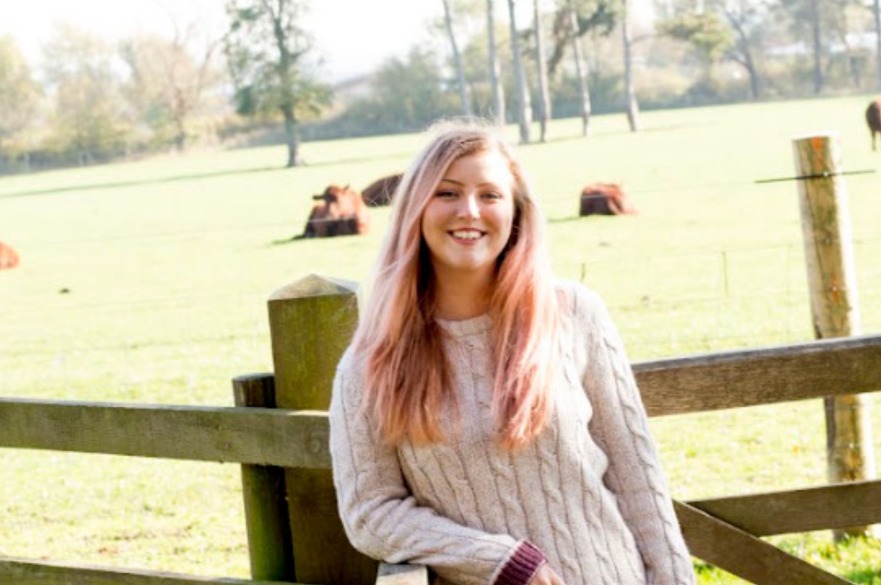
I am so glad to have chosen NTU to complete my master’s degree and appreciate all the wonderful opportunities that I’ve gained through my course.
More about Katherine
Why did you choose to study at NTU?
Volunteering abroad in Malawi Africa in 2018 with Carnivore Research Malawi (CRM), I worked alongside graduate students from NTU. I spoke with these students and asked in depth questions about their graduate studies and the types of courses that were offered at NTU. It was very exciting to learn that NTU was a sponsor of CRM’s ongoing carnivore conservation projects overseen by Dr. Emma Stone to address and mitigate human-wildlife conflicts and studying the urban ecology of species like the spotted hyaena. For these reasons I was very intrigued about NTU and wanted to apply to their School of Animal, Rural and Environmental Sciences.
What did you learn – both inside and outside of lectures?
During lectures I learned how to rigorously apply scientific research methods and gained technical skills using programs like R code to facilitate statistical analyses and ArcGIS mapping software to visually represent and analyse spatial data. A key component of these lectures involved effective field surveying techniques as well as integration of population genetics to improve recovery outcomes for endangered species. Because of comprehensive discussions on conservation principles and priorities of relevant case studies, lectures at NTU taught me to develop valuable critical thinking skills and problem solving techniques in order address complex challenges to wildlife conservation efforts.
Going abroad to work on my master’s thesis in Romania, I had the opportunity to apply what I’d learned during my lectures at NTU in addition to gaining greater knowledge and practical experience from my internship with Fauna and Flora International (FFI). Assisting FFI researchers, I helped mitigate human-wildlife conflicts impacting local pastoral communities. Through meaningful engagement with Carpathian shepherds, I observed how FFI cooperatively problem solved livestock losses from wolves and bears by using non-lethal preventative measures to achieve greater outcomes of human-wildlife coexistence.
I have continued to build upon these important academic and internship experiences, honing practical skills which have greatly aided in my professional growth within the field of wildlife conservation.
What have you been up to since graduating? E.g. working in industry, further study, volunteering, research projects etc.
Since attending NTU and receiving my MSc. Endangered Species Recovery and Conservation I have worked as a seasonal wildlife research technician on projects across the US which have focused on monitoring different game and carnivore species. The use of VFH radio telemetry was a big part of how I tracked and monitored nesting Eastern wild turkeys for the University of Tennessee, Knoxville. My course at NTU played a big role in teaching me the practical application of how to use this type of equipment in the field.
Most recently I worked in California as part of the Region 5 Sierra Nevada Carnivore Monitoring Program run by the US Forest Service and affiliated with The Great Basin Institute. The project utilised surveys and the collection of genetic hair samples to monitor pacific marten and endangered fisher populations. The data gathered for this 20+ year project is crucial to helping develop a species recovery action plan that will inform conservation policy-making for protected fisher populations across the Sierra Nevada Mountain range. Because of my modules through NTU I learned valuable conservation strategies and monitoring techniques which I practically applied while assisting in the conservation efforts for an endangered species.
I have stayed in touch with my NTU professors and members of my cohort as well as maintained professional relations with colleagues from different research projects. NTU has provided me with a great network within the field of wildlife conservation. I’ve also connected with NTU ARES Employability personnel through professional social media. All of these experiences both abroad and within the US have helped shape me into a global citizen.
What does your current day involve?
Working as a seasonal wildlife research technician, I’ve had the opportunity to hone important, practical skills necessary for conducting fieldwork. Most of the workday involves remote off-trail hiking and camping in high-altitude terrain. Survey sites are located using topographic maps, a compass, and a GPS device to navigate intact forests and burn areas. Survey equipment includes setting up and maintaining camera traps, special apparatuses used to collect hair samples, and track plate boxes for detecting species tracks. Once teams have returned to the work centre at the end of the week, species detections are recorded and added to an online database. Camera photos are reviewed, hair samples of verified pacific marten and fisher are processed and sent off to a lab for genetic analysis, and species tracks are identified before being digitally copied to a photo library.
What attracted you to this field?
I have always had a great love and passion for wanting to work with animals. The first time I learned about the subdiscipline of conservation biology was during my undergraduate studies. Pursuing volunteer and internship opportunities also helped prepare me to return to postgraduate studies at NTU to further my knowledge and improve my practical application of research techniques in the field of wildlife conservation for endangered species.
What have been the highlights and biggest challenges of your career so far?
Because of my academics and practical work experience, I have had many opportunities to travel across the globe to many countries all while building a diverse skillset and learning to apply effective survey and monitoring techniques. My long-term goal in the field of conservation has been to specialise in a career focused on large carnivore recovery and managing human-wildlife conflicts. My academic achievements through NTU and employment opportunities have greatly contributed to me further gaining knowledge and experience that has made me confident in my capabilities as a researcher.
There have been challenges to working within this specific field, particularly as it relates to seasonal employment. Though I have been very fortunate to work as a wildlife research technician on different projects where I gained valuable, practical work experience that has made me a competitive applicant among wildlife researcher technicians, seasonal positions do not offer much stability. Therefore, I hope to find jobs in wildlife conservation that offer a more permanent placement in the future.
What are your plans for the future?
My next seasonal job opportunity will be assisting a Ph.D student from Southern Illinois University in monitoring carnivore species across the southern region of the state. Predator occupancies will be determined for gray fox, red, fox, coyote, bobcat, racoon, and striped skunk. I am very excited to keep developing and honing conservation skills I learned and applied because of NTU, and the seasonal work experience gained from other research projects.
If you had a time machine, what would you go back and tell yourself at NTU?
I would go back and tell myself that even though I’d started my post-graduate studies in the midst of the pandemic— and it being very difficult because of covid restrictions— there were still opportunities to be had. It would also be important to tell myself that I’d find ways to strengthen my connection to NTU, especially as an alumna because of the professional connections I made and have continued to maintain.
Finally, is there anything else you’d like to share with our student and alumni community?
I am so glad to have chosen NTU to complete my master’s degree and appreciate all the wonderful opportunities that I’ve gained through my course. I would recommend the university to other students considering returning to postgraduate studies.
Still need help?
-

STUDENT PROFILE
Jacob Walton
Applied Ecology and Geospatial TechniquesUnited Kingdom
https://www.ntu.ac.uk/study-and-courses/courses/our-students-stories/animal-rural-environmental-sciences/jacob-walton
-

STUDENT PROFILE
Josh Shaw
Endangered Species Recovery and ConservationUnited Kingdom
https://www.ntu.ac.uk/study-and-courses/courses/our-students-stories/animal-rural-environmental-sciences/josh-shaw
-

STUDENT PROFILE
Savannah Storm
Endangered Species Recovery and ConservationUnited Kingdom
https://www.ntu.ac.uk/study-and-courses/courses/our-students-stories/animal-rural-environmental-sciences/savannah-storm